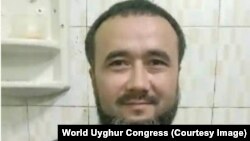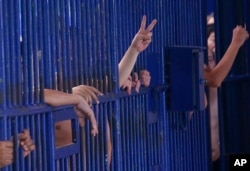A second ethnic Uyghur man has died this year from among the 50 or so Thailand has been holding in detention center limbo since 2014, amplifying calls from rights groups for their release and resettlement.
The World Uyghur Congress announced the death of Mattohti Mattursun, also known as Muhammad Tursun, on April 24. It says the 40-year-old was transferred from the Suan Phlu Immigration Detention Center in Bangkok to a local hospital on April 21 but died the same day.
Another Uyghur man being held at the same center, 49-year-old Aziz Abdulla, died February 11.
Both were among the roughly 50 Uyghurs left in Thailand from the hundreds caught entering the country in 2014 after fleeing China, which the United States and others have accused of genocide over its treatment of the mostly Muslim minority, a claim Beijing denies. Most have since been forced back to China or deported to Turkey, where Uyghurs claim kinship with the ethnic Turkic majority.
Thai authorities have not confirmed Mattohti’s death, and a spokesman for the national police, which runs the country’s immigration centers, ignored VOA’s requests for comment.
However, Chalida Tajaroensuk, who runs a local charity in contact with the detainees through the food donations it makes to the detention center, told VOA that other Uyghurs in the group verified Mattohti’s death. She said a source of hers inside the police also verified his death.
The Central Islam Council of Thailand also told VOA that it had received Mattohti’s body from the authorities last week and buried it next to a Bangkok mosque.
Rights groups say the deaths of two men in their 40s fewer than three months apart highlights the poor conditions the Uyghurs are being held in and the need for better care.
“It’s very clear that they are bad conditions inside — bad condition of food, bad condition of living, very crowded, and no health check,” said Chalida. “There are very simple and basic health rooms, clinic rooms downstairs ... no doctors, only nurse.”
In a statement, Human Rights Watch Asia Director Elain Persons said Thailand’s treatment of the detained Uyghurs was putting them “at grave risk,” adding that Mattohti’s death “should sound the alarm to end this abusive policy of incarcerating asylum seekers and refugees for prolonged periods.”
The death certificate the hospital issued for Aziz in February listed the cause of death as a lung infection. Polat Sayim, who runs the World Uyghur Congress’s refugee program from Australia, said they have yet to see a death certificate for Mattohti but suspect liver failure as the cause based on his symptoms, which included stomach pain, a swollen tongue and yellowed eyes.
Like Aziz, Polat said, Mattohti had been sick for weeks before authorities finally took him to the hospital and that he was losing his appetite and vomiting repeatedly. Polat said the cramped, smoke-filled holding cells, dirty tap water and meager meals were bound to make the detainees sick, and that many were suffering mentally as well.
“They [have been] staying in one small room a long time,” he said. “Just imagine if they lock you in one cell, you cannot contact with the outside, you don’t know nothing, just staying in one room, just sitting and walking around a small place. What do you think? People sometimes - they are getting crazy, mentally ... getting sick.”
Polat said the World Uyghur Congress has been urging Thailand to let other willing countries take in the Uyghurs.
Thailand deported 173 of the Uyghurs in 2015, following their arrival a year earlier. Most were women and children. A week later, though, it deported another 109, mostly men, to China, setting off a wave of condemnation at home and abroad.
“So many times we have asked the Thai government to release them, but Thai government answers us they don’t have place to go because no third country wants to take them,” said Polat. “But we [are] talking with the third countries, some European countries, and they have some countries that want to take them. ... But still Thai government I don’t know why they don’t release them; maybe too much pressure from the Chinese Communist Party.”
Chalida said she has been told as much by Thai lawmakers whom she, too, has asked for help in getting the Uyghurs released.
“We also [have] negotiation many times in the Foreign Affairs Committee in the parliament; they are meeting with many authorities who are involved with the Uyghur issue and they say that because of China they cannot allow them to go to the third country but they guarantee that they will not send back to China.”
Thai authorities will not explain why they have held the Uyghurs in limbo for the past nine years, neither sending them back to China nor letting them resettle.
In an interview with VOA last year, though, a national security adviser to the prime minister conceded that a solution had been “stalled” by the competing wishes of the Uyghurs to move on and of China to have them back. At the time, a spokesman for the Ministry of Foreign Affairs said Thailand would continue to hold the Uyghurs “until a practical and viable solution for the group can be found.”
Until then, Chalida said the authorities should at least make their stay more tolerable, first by providing them with better health care, and then letting them out of the Suan Phlu facility to move to host communities elsewhere in Thailand, which has a sizeable Muslim community in the far south.
“It should be step by step,” she said. “I want them to release [the Uyghurs], but if we ask right now it’s impossible, we ask something beyond the reality.”






